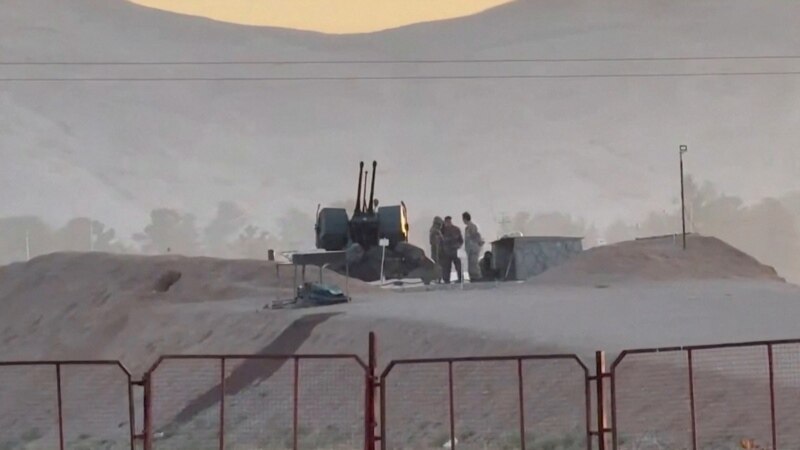Tel Aviv and Tehran both played down Friday’s pre-dawn Israeli airstrikes into Iran, a sign that neither side wants to see the situation escalate into a full-blown regional conflict.
Israel has made no official comment on the incident.
The Islamic Republic News Agency (IRNA) only “quoted an Iranian official as saying” that the air defense system had been activated after “explosions” were heard near a major air force base in the central province of Isfahan early on Friday.
The report quoted US media sources as saying that the attack was carried out by Israel. The statement also said that no damage was reported and “the situation in the city and province of Isfahan is normal.”
Previously, Iranian official media also downplayed the incident, saying that the Isfahan nuclear facility was safe. They said operations at Tehran’s Imam Khomeini International Airport and Mehrabad Domestic Airport had returned to normal on Friday, hours after flights were suspended due to alleged Israeli airstrikes.
Iranian Foreign Minister Hossein Amirabdullahian downplayed the significance of the attack in comments to Muslim diplomats at the United Nations in New York on Friday. He said Israel “was trying to win from defeat and the downed mini-drone did not cause any damage or casualties.”
Reuters quoted a senior Iranian official as saying that there were no plans to respond to Israel over the incident.
New York Times and Washington post Israeli officials were quoted as saying that Israel carried out air strikes against Iran. Multiple news outlets quoted U.S. officials as saying it was a missile attack.
Israel and Iran both responded in a low-key manner following near-unanimous calls from world leaders for calm and a de-escalation of tensions.
Italian Foreign Minister Antonio Tajani, host of the G7 ministerial meeting on the Italian island of Capri, said on Friday that Israel had informed the United States of the attack “at the last minute.”
U.S. Secretary of State Antony Blinken was asked multiple times to comment on the reports at a news conference following Friday’s G7 meeting in Italy, but declined to do so.
“The United States is not involved in any offensive operations,” Blinken responded. “What we are concerned about, what the G7 is concerned about, and what is reflected again in our statements and conversations, is our efforts to de-escalate tensions.”
U.N. Secretary-General Antonio Guterres “reaffirmed that now is the time to stop the dangerous cycle of retaliation in the Middle East,” said his spokesman Stéphane Dujarric.
“The Secretary-General condemns any act of reprisal and calls on the international community to work together to prevent further developments that would have devastating consequences for the entire region and beyond,” the statement said.
The airstrike marked the latest salvo in the years-long Israeli-Iranian shadow war, which has escalated dramatically this month. Israel has warned Iran it will retaliate for an unprecedented air strike on Israeli territory last Sunday involving hundreds of drones and missiles. Israel says it intercepted nearly all the projectiles with help from a coalition of Western allies and Arab partners.
Iran warned that any retaliatory strikes by Israel would be met with a swift and tougher response.
Ahmed Fouad Alkhatib, a Middle East security analyst at the Atlantic Council, told VOA that Iran’s low-key response may be to avoid an escalation of confrontation if Tehran’s nuclear program is not directly targeted.
“There are estimates and calculations that Iran may be willing to absorb and accept limited retaliatory strikes from Israel. However, strikes against Tehran’s nuclear program will sharply escalate the direct confrontation between Iran and Israel,” he said.
The United States and other Western powers have urged the Israeli government to avoid escalating the conflict as it considers its next steps. U.S. officials have said they do not plan to involve U.S. troops in any retaliatory actions by Israel.
Al-Khatib told VOA that the Biden administration understands Israel’s need to retaliate “face-savingly” against Iran’s attack on Sunday.
“Any attack by Israel would require U.S. participation, cooperation, support and ultimately support – whether defensive or offensive – calling into question the Biden administration’s claim that it will not engage in Israeli retaliation,” Al-Khatib said. cast doubt on its accuracy.”
Michael Lipin, Patsy Widakuswara, Margaret Besheer and VOA’s Kurdish and Persian services contributed to this report contribute.
Information for this report was provided in part by The Associated Press, Reuters and AFP.
Follow us on Google news ,Twitter , and Join Whatsapp Group of thelocalreport.in
